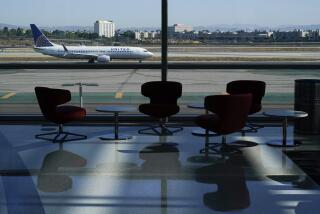Additional gates promised at LAX
- Share via
Responding to revelations that airlines are increasingly taking lucrative international flights to cities with newer facilities, Los Angeles officials on Monday announced they will build more parking spots for aircraft on the back of LAX’s aging international terminal.
Under pressure from airlines, who have threatened to take additional flights elsewhere, lawmakers agreed to resurrect the project, which would install 11 new gates on the west side of the facility. The work, which will be separate from the remodeling project that got underway Monday at the Tom Bradley International Terminal, is expected to take years.
At a groundbreaking ceremony for the $723.5-million modernization of the overcrowded Bradley terminal, lawmakers emphasized they will not concede Los Angeles International Airport’s standing as the premier U.S. gateway to the Pacific Rim.
“Let the games begin,” Mayor Antonio Villaraigosa said, as weary travelers pushed overloaded luggage trolleys behind him. “When we’re finished with this modernization project, this is going to be a world-class facility.”
But airlines contend the project is too little, too late. When it’s completed in three years, the remodel will not add any space to the 1-million-square-foot Bradley building, leaving it half the size of San Francisco’s gleaming new international terminal. Northern California officials are using that facility to lure carriers away from LAX.
The Times reported last week that LAX, over the last six years, has lost 12% of the seats on its weekly international departures, while other major U.S. gateways posted gains in service to foreign destinations. Carriers cited LAX’s outdated terminals for the reduction, as well as the introduction of more fuel-efficient aircraft that allow them to bypass the facility.
Industry watchers also said that a recent decision by aircraft manufacturer Airbus to fly its highly anticipated A380 super-jumbo jet on its first U.S. test flight next month to New York instead of Los Angeles, as company officials had promised, was due to LAX’s inability to provide more than two terminal parking spots for the plane.
On Monday, however, officials appeared to be near a deal to bring the 555-seat aircraft to LAX, after Airport Commission President Alan Rothenberg and Qantas Airways sent strongly worded letters to Airbus in Toulouse, France, demanding that it reconsider its decision.
“We’re discussing the possibility for an Airbus A380 to land at LAX on the same day it lands in New York,” said Ian Gregor, a spokesman for the Federal Aviation Administration, which must approve plans by the manufacturer to land the jumbo jet in the U.S.
Meanwhile, at the Bradley terminal, officials vowed to limit inconveniences for 10 million travelers a year who will continue to fly on 34 airlines that offer service at the building as workers undertake the largest single project in the city’s history.
Up to 400 workers will be on the site at a time, installing new paging, air conditioning and electrical systems, elevators and escalators. They also will incorporate truck-sized explosives-detection machines into the building’s underground baggage system, freeing up room in ticket lobbies for passengers.
As the project is underway, airlines plan to push city leaders to stick by their promises. They include Councilwoman Janice Hahn, chairwoman of the council’s Trade, Commerce & Tourism committee, who said Monday that she would lobby for new gates at the Bradley terminal.
“The mayor understands the need to be competitive with other gateway cities,” said Frank Clark, executive director of the nonprofit organization that represents airlines operating at the Bradley terminal. “Our hope is that this is the impetus that causes the delay to be broken.”
For years, carriers have asked for the gates -- which Los Angeles is allowed to build under an agreement with airport-area residents -- and they were surprised to learn recently that the city had not yet moved forward.
According to existing plans, the new parking spots for aircraft at the Bradley terminal would replace the remote gates near sand dunes on LAX’s western edge. Airlines do not like to use remote gates because of the inconvenience to passengers.
More to Read
Inside the business of entertainment
The Wide Shot brings you news, analysis and insights on everything from streaming wars to production — and what it all means for the future.
You may occasionally receive promotional content from the Los Angeles Times.










